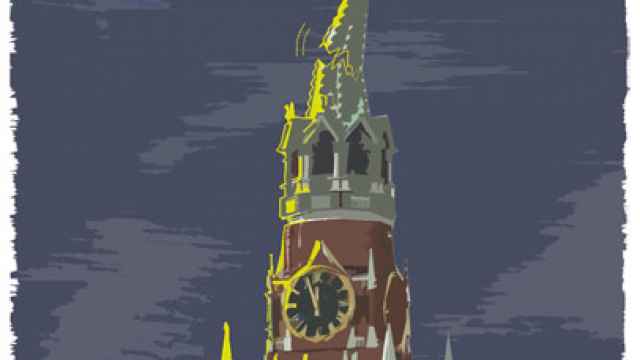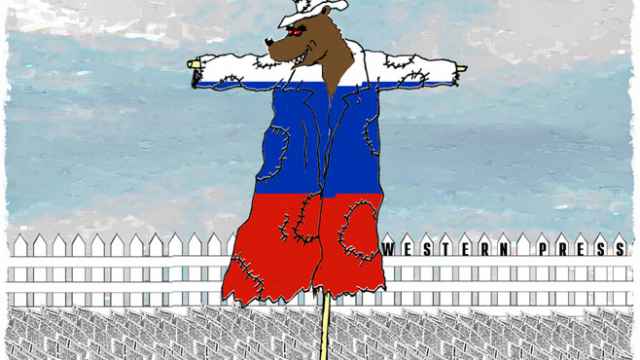A tragedy occurred in St. Petersburg in mid-October: Federal Migration Service employees detained a family of Tajik illegal immigrants in an abandoned house, including the young mother of a 5-month-old infant. The woman did not speak Russian.
During the time that migration officials and police carried out the necessary formalities for a court to issue a deportation order, the infant was kept separately from the mother, and for some as yet unexplained reason, other relatives were also denied access to the child. In the end, the infant required hospitalization and died in the hospital a few hours later — but, as the authorities hurried to claim, from a pre-existing illness.
Relatives are certain that the police and doctors are to blame for the infant's death, and that it could have been avoided if the authorities had simply allowed the mother to continue holding her child.
Russian society responded to the incident only after an approximately two-week delay.
The first to become agitated was the Tajik diaspora — upward of several hundred thousand people in large Russian cities who mostly came here before the current recession in hopes of finding a better life.
Then the Foreign Ministry responded, posting a strange note on the site of its Russian Embassy in Tajikistan. After expressing condolences for the child's death, it called on people not to "rock the boat" in the face of terrorism that poses a threat to the Tajik and Russian people alike.
We Russian journalists waited for the emergence of some clear and verifiable information of what happened. Almost two weeks later, when social networks were full of accounts of the incident, there was nothing left to do but begin reporting on the story in the media.
In this case, journalists followed the lead of society — or rather, that small part of society that actively proclaims its position on the issues and takes the news to heart. This segment of the population largely makes up the audience of Russia's print media, whose members are still trying to uphold their professional standards.
The vast majority of the people, those whose world view is informed by one or two state-controlled television channels, remained indifferent. A drama that in any Western country would have dominated headlines and television news, that would have led to the resignation of the guilty officials and to mass rallies expressing solidarity with the victims, went completely unnoticed in Russia for a full two weeks.
Now that leading newspapers have picked up the story of the child's death, it will probably appear on television screens as well — but with a delay of two weeks. By that time, the television news editor, who must stay in the Kremlin's good graces for his livelihood, will have formal grounds to tell his reporters: "We don't deal with two-week-old news."
This two-week delay probably indicates that something is wrong with the emotional condition of Russian society. On one hand, the Russian people become euphoric over the annexation of Crimea, war in Ukraine, military operations in Syria and reports that President Vladimir Putin now enjoys a nearly 90 percent popularity rating. On the other hand, that same society cannot find the will to respond to news of an infant's tragic death in St. Petersburg.
Some observers suggest that the problem stems from the traditionally high level of xenophobia here and that Russians view migrants' problems as pertaining to them alone. However, a short Google search makes it clear to anyone who is interested that Russian infants also die when they are taken from their parents for legally obscure reasons.
The difference is that those Russian families are not part of a concerned diaspora, or a country that backs up that diaspora with all of its many resources. It turns out that Russian families that have been wronged might have even less hope of overcoming society's silent indifference than the Tajik migrant workers huddled in an abandoned house in St. Petersburg.
If we really see ourselves as the people of one country, then this collective "we" has a big problem. We are not a diaspora. We live in our own country. And yet we often cannot rely on that country. That country can even kill our children and then remain deaf to our grief. And I speak not only of the impersonal machinery of state, but of this collective "we" — if, in fact, it even exists in that sense.
It seems that Russians were just as emotionally deaf concerning reports of casualties in eastern Ukraine. Whether or not the Russian government admits to conducting military operations in the region, we citizens know that many of our countrymen are there, if only as volunteers.
And no matter what we think of their political choice to take up arms and go to the Donbass, or how we believe that decision will affect the Donbass, the soldiers themselves or the Russian people, they carry the same type of passport in their pockets as we do. Accordingly, we cannot but feel saddened to see a convoy of military trucks bearing coffins as it winds northward from Ukraine into the Rostov region.
That is a normal reaction to a person's death, regardless of the passport in his pocket, much less his political views. But Russians never displayed such a reaction. Television reports showed trucks carrying coffins almost all of last year, but the Russian people did not so much as mumble a response. The story that military graves of soldiers who had died in Ukraine were discovered near Pskov led only to the persecution of the people who uncovered the story, and not to any form of public reaction to the news.
The same seems to apply to the almost unverifiable reports of injuries and casualties among Russian troops serving in Syria. What should normally become the leading and most enduring news story — one that could undermine public support for the deployment of Russian troops to Syria — appears as an afterthought in news reports of inconsequential events.
It is difficult to escape the impression that Russians are suffering from some form of emotional abnormality.
There might be different explanations for it. For example, some might claim that this blunting of society's emotional responses is a natural result of several years of relentless state propaganda. Others might point to a quiet restoration of totalitarianism. According to theorists on the subject such as Hanna Arendt, this process leads to an elimination of individual emotional space and the fusion of all individuals into a unified, manageable and aggressive mass.
There is also a third possibility. Russian society's inability to mount an emotional response to troubling events might be similar to the way the pupils do not respond when a policeman shines his flashlight into their eyes of someone he suspects to be dead. Russian society's inability to respond in a timely manner to serious injustices, just like a pupil that does not respond to light, cannot mean anything good. Perhaps it is time to rouse ourselves from this stupor — that is, if we still have a choice.
Ivan Sukhov is a journalist who has covered conflicts in Russia and the CIS for the past 15 years.
A Message from The Moscow Times:
Dear readers,
We are facing unprecedented challenges. Russia's Prosecutor General's Office has designated The Moscow Times as an "undesirable" organization, criminalizing our work and putting our staff at risk of prosecution. This follows our earlier unjust labeling as a "foreign agent."
These actions are direct attempts to silence independent journalism in Russia. The authorities claim our work "discredits the decisions of the Russian leadership." We see things differently: we strive to provide accurate, unbiased reporting on Russia.
We, the journalists of The Moscow Times, refuse to be silenced. But to continue our work, we need your help.
Your support, no matter how small, makes a world of difference. If you can, please support us monthly starting from just $2. It's quick to set up, and every contribution makes a significant impact.
By supporting The Moscow Times, you're defending open, independent journalism in the face of repression. Thank you for standing with us.
Remind me later.






